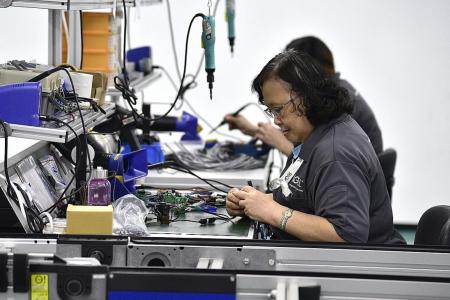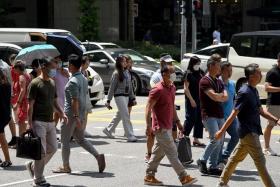Snef seek help in Budget to defray older workers' costs
SNEF looking to Budget to provide wage offsets so businesses can cope
Employers are calling on the Government to provide wage offsets in this year's Budget measures to help businesses cope with the raising of the statutory retirement and re-employment ages, as well as Central Provident Fund (CPF) contribution rates for older workers over the next two years.
The Singapore National Employers Federation (SNEF) said yesterday it is proposing the Government help defray the employment costs associated with hiring older workers, similar to the Special Employment Credit scheme which expires at the end of this year.
This scheme provides employers with wage offsets of up to 8 per cent of monthly pay for Singaporean workers aged 55 and above earning up to $4,000.
An additional offset of up to 3 per cent is available for employers that hire older workers turning 67 and above.
SNEF also proposed transitional one-off wage offsets for employers to mitigate the higher CPF contribution rates, which kick in on Jan 1 next year.
CPF contribution rates for those aged 55 to 70 will be raised gradually over this decade until those aged 60 and below enjoy the full CPF rates.
The retirement age will also be raised from 62 now to 63 from July 1, 2022, and eventually to 65 by 2030. The re-employment age will be raised from 67 now to 68 from July 1, 2022, and eventually to 70 by 2030.
Prime Minister Lee Hsien Loong said at the National Day Rally last year that a support package to help businesses adjust to the changes will be announced in this year's Budget.
SNEF submitted its recommendations to the Ministry of Finance in August last year.
"Employers recognise the wealth of knowledge and experience older workers have to contribute, and are committed to employ older workers," said SNEF yesterday. "However, there are some key challenges associated with hiring older workers, such as higher wage costs, higher medical costs from insurance, and ensuring that older workers continue to have relevant skills."
Its other recommendations include providing funding to help employers start a "re-careering programme" and being more proactive in reskilling older workers well before the retirement age so they can be moved to other roles, if needed, during re-employment.
SNEF also asked for funding to help employers provide more part-time re-employment opportunities for older workers beyond retirement age. Firms could use this money to redesign jobs or hire an additional older worker to take on part of a specific job, said SNEF executive director Koh Juan Kiat.
Finally, the group called for support in promoting the benefits of portable medical benefit schemes.
Mr Koh said this could mean employers making additional contributions to workers' Medisave accounts instead of buying group medical coverage. Workers can then use the top-up to pay for MediShield Life premiums or an Integrated Shield Plan, or save it for their retirement years.
Get The New Paper on your phone with the free TNP app. Download from the Apple App Store or Google Play Store now



